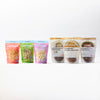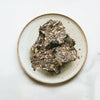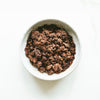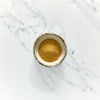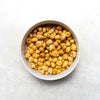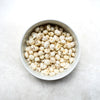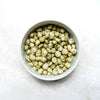
Vata Diet - A Complete Guide to Vata Ayurvedic Diet
Reviewed By : Michele Porter - Nutritionist
According to Ayurveda, three bio-energies, known as doshas, control our body and mind - Vata, Pitta, and Kapha. Each dosha has unique characteristics and requires specific dietary recommendations to maintain balance and harmony.
The main signs of knowing whether you are suffering from Vata dosha are as follows:
- Cold hands and feet
- Struggling to put on weight
- Dry skin, bloating, gas, joint pain
- Feeling unfocused and disorganised
- Facing intermittent issues such as sleeplessness and constipation
You may be experiencing an imbalance in your Vata dosha. This article will focus on balancing Vata dosha with a Vata diet.
What is a Vata Diet?
A Vata diet balances the Vata dosha and alleviates these symptoms by incorporating warm, moist, and grounding foods.
A Vata diet comprised of foods that are
- Warm
- Moist
- Grounding
It means that your food should be warm, oily, heavy, well-spiced foods with sweet, sour, and salty tastes that help nourish and ground the body. Foods that are dry, cold and raw should be avoided as they can aggravate Vata and lead to digestive issues.
Let's dig deep into these foods and how you can consume them.
What To Eat In Vata Diet?
The first and foremost thing is to try not to skip meals. Instead, eat three warm, cooked meals daily at about the same time each day.
- Warm and Cooked Foods
Warm, cooked foods are grounding and nourishing for the Vata dosha. These include soups, stews, casseroles, and grains like oatmeal, quinoa, and rice. Cooked vegetables like sweet potatoes, carrots, and beets. Squash is also an excellent choice.
- Warm Spices
Warm spices like ginger, cinnamon, cardamom, and black pepper are excellent for Vata digestion. They help to stimulate the digestive fire and improve the absorption of nutrients. They also provide warmth and comfort to the body.
- Healthy Fats
One of the most crucial ingredients of the Vata diet is healthy fats. They help to nourish the body and keep the digestive system functioning properly. The ones that you should add to your diet plan are nuts, seeds, ghee, coconut oil, olive oil, avocados, and fatty fish like salmon.
- Sweet Fruits
Sweet fruits like bananas, dates, and figs are excellent for Vata as they provide natural sweetness and nourishment. They are also warming and grounding for the body. Other recommended fruits include cooked apples and pears.
- Herbal Teas
Herbal teas like ginger, liquorice, and chamomile are excellent for Vata as they provide warmth and comfort to the body. They also help to calm the nervous system and improve digestion.
Adding all these to create your Vata diet is a simple and easy technique. At the same time, you might be wondering what kind of dishes we have listed a few options for you.
Some Delicious Vata Diet Dishes
If you are just wondering how to bring these warm and moist foods together to bring that balance you are looking for, then look no further than Foodhak. The platform has a plethora of options that you can try and enjoy. All these are prepared with proper caution to ensure you get the best results.
The top ones in the list of the Vata diet are as follows:
The asafoetida provides a savoury onion and garlic taste, while the curry leaves and fenugreek leaves add an extra layer of savouriness. To give it a tangy kick, tamarind is included. And for even more flavour, we've added toor dal, black pepper, coriander, cumin, and red chillies. Together, these ingredients create a mouth-watering and aromatic soup that will tantalise your taste buds and add the warmth your body needs.
A classic Indian recipe with mild spices, red lentils, onions, long-grain basmati rice and carrots is a healthy option. A comforting meal gently flavoured by garlic and spices such as cumin, ginger, turmeric and fennel, you are going to love it.
Foodhak's mild curry is inspired by delicious flavours from the Malabar Coast. It features the comforting textures of butternut squash, kale's healthy qualities, and delicate Indian-inspired flavours, such as curry leaves and turmeric.
It contains chickpeas, fresh carrots and green olives, cherry tomatoes, a dash of olive oil, and a generous sprinkling of spices to create a meal you'll love.
These are just a few options that you can try. Foodhak is based on scientific research, the latest tech, and traditional Ayurvedic principles. These basic Ayurvedic principles are the foundation stones for all Foodhak meals.
What Not To Eat In Vata Diet?
It is essential to acknowledge that knowing what foods to eat and what you should avoid is crucial when following a Vata diet. Although numerous foods are beneficial for Vata, there are also some foods that you should limit or avoid. These include:
- Cold and Raw Foods
Vata dosha benefits from warm, cooked foods and can be aggravated by cold and raw foods. Avoid cold salads, raw vegetables, and iced drinks.
- Light and dry foods
Vata dosha benefits from heavier, more substantial moist and grounding foods. Foods that are dry and light, such as crackers, popcorn, and dry cereal, may aggravate Vata dosha.
- Stimulants
Vata dosha is already characterised by movement and stimulation, so consuming additional stimulants like caffeine can aggravate it. Limiting or avoiding coffee, tea, and other caffeinated beverages is best.
- Carbonated drinks
Carbonated drinks can aggravate Vata dosha, which can create more movement and disturbance in the body. Avoid soda and sparkling water, and instead opt for still water or warm, non-caffeinated beverages.
- Excessively spicy foods
Vata dosha benefits from mild spices and herbs but can be aggravated by excessively spicy foods. If you enjoy spicy food, try milder spices such as ginger or cinnamon, and avoid hot peppers, cayenne, and other fiery spices.
- Foods with refined sugar
Vata dosha benefits from sweet foods but not those high in refined sugar. Instead of refined sugar, use natural sweeteners like honey, maple syrup, or dates.
Benefits of a Vata Diet
Following a Vata diet can have numerous benefits for the body and mind, like below:
- Improved Digestion
Vata imbalances can cause digestive issues like constipation, bloating, and gas. Following a Vata diet can help to improve digestion and alleviate these symptoms.
- Better Sleep
Vata imbalances can cause insomnia and restlessness. Eating warm, nourishing foods can help to calm the nervous system and promote better sleep.
- Increased Energy
Vata imbalances can cause fatigue and lethargy. A Vata diet can help to nourish the body and increase energy levels.
- Reduced Anxiety
Vata imbalances can cause anxiety and nervousness. Eating warm and grounding foods can help to calm the mind and reduce anxiety.
- Improved Overall Health
Following a Vata diet can help to balance the Vata dosha and promote overall health and well-being. It can also help to prevent and alleviate Vata imbalances and their associated symptoms.
Conclusion
A Vata diet is specifically designed to balance the Vata dosha and promote overall health and well-being. It emphasises warm, cooked, and nourishing foods that help to ground and nourish the body. Individuals with a Vata dominant constitution or those experiencing Vata imbalances can improve their digestion, sleep, energy, and overall health by following a Vata diet.
It is important to note that Ayurveda is a holistic system of medicine, and dietary recommendations are just one aspect of treatment. It is always a better decision to consult with a qualified Ayurveda practitioner before significantly changing your diet or lifestyle. You can achieve optimal health and well-being by incorporating Ayurveda principles into your life. Visit Foodhak to know more.
Also read: Guide to Ayurvedic Diet, Reasons To Start Ayurvedic Diet
